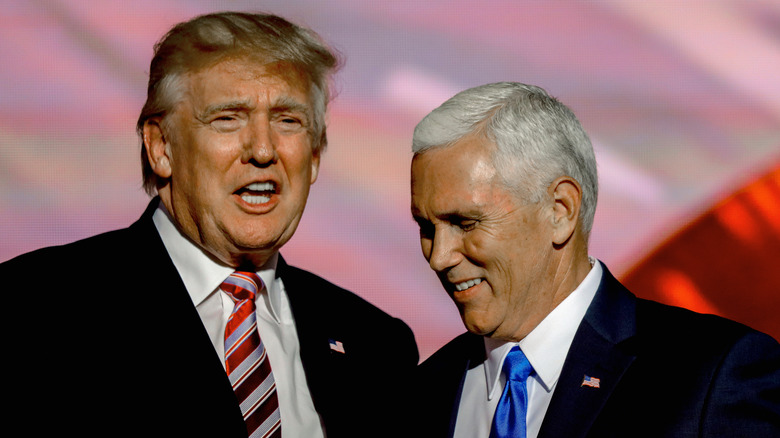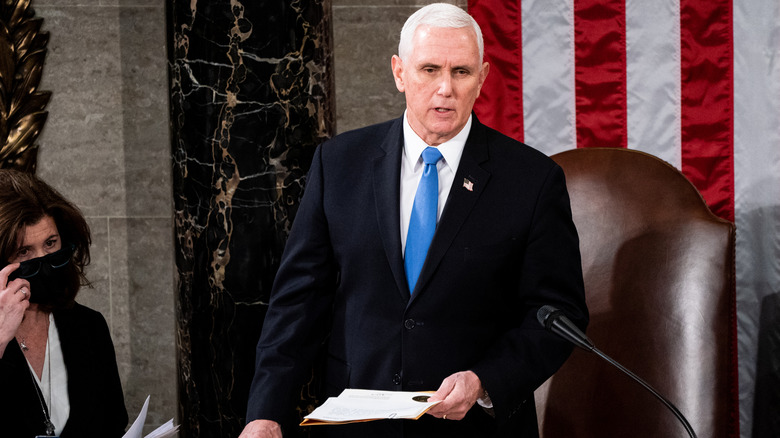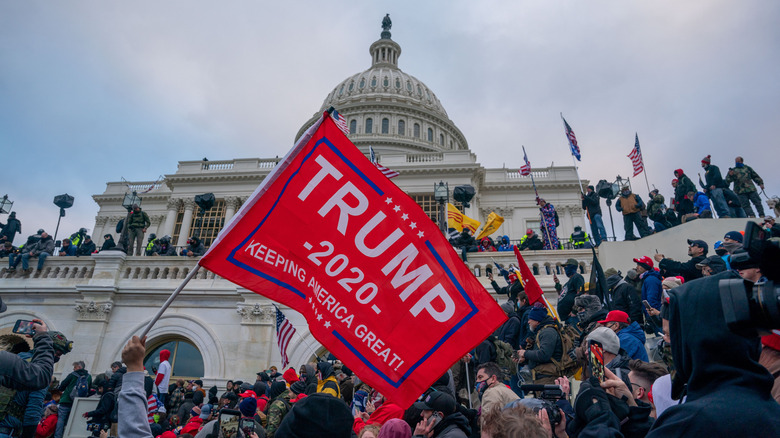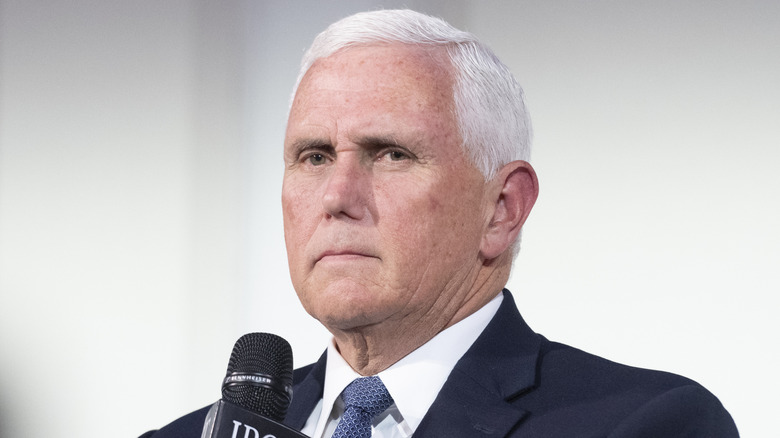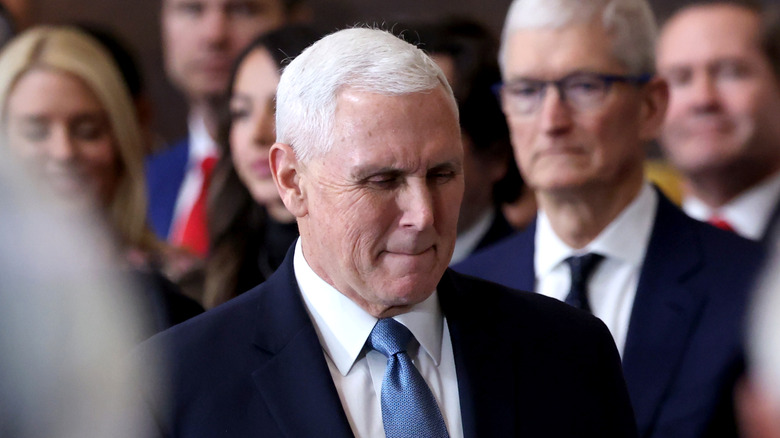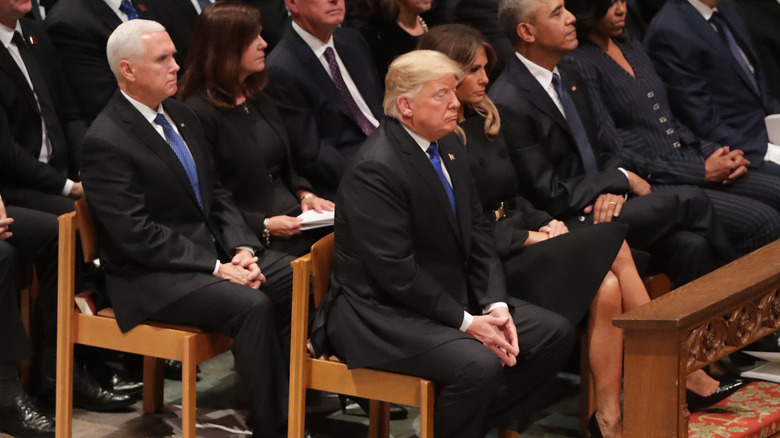Inside The Complicated Relationship Between Trump And Former VP Mike Pence
In his latest act of baseless finger-pointing, President Donald Trump has (wrongly) claimed that Ukrainian President Volodymyr Zelenskyy is a dictator who threw the first stone in what would eventually become the Russia-Ukraine War. Later, on February 19, former Vice President Mike Pence called out his old boss for his recent comments. "Mr. President," he posted on X, "Ukraine did not 'start' this war. Russia launched an unprovoked and brutal invasion claiming hundreds of thousands of lives. The Road to Peace must be built on the Truth."
This isn't Pence's first time taking Trump to task. It begs the question: What's the relationship like between these two these days? We know about their fallout in the wake of the January 6 attack on the United States Capitol, but what transpired before and after that major turning point in their professional relationship? Are things still icy between them? Given Pence's tone toward Trump in his latest call-out, it seems safe to say things are pretty unstable between them. The timeline of their difficult relationship confirms this suspicion.
The January 6 Attack made their strained relationship even worse
Before the events of January 6, 2021, things between former President Donald Trump and his Vice President, Mike Pence, were already deteriorating. Although Pence was widely regarded as one of Trump's most loyal allies throughout their administration, the cracks in their relationship were impossible to ignore during the final months of their tenure. As Trump refused to accept the results of the 2020 election, Pence found himself in an increasingly difficult position, caught between his constitutional duties and his allegiance to the president.
In his memoir "So Help Me God," Pence details the growing pressure he faced from Trump and his inner circle to overturn the election results. He recounts multiple conversations where Trump urged him to reject Electoral College votes or send them back to the states (something the vice president had no constitutional authority to do).
Pence tried to counsel Trump in the days and weeks that followed, suggesting that instead of contesting the election, he should respectfully concede and focus on a political comeback. "I told him that I had prayed for him for the past four and a half years, and I encouraged him to pray," Pence wrote (via PBS). "'Jesus can help you through this,' I said. 'Call on Him.'" However, Trump seemed unmoved by this spiritual advice. "He didn't say anything," Pence detailed.
Pence and Trump would never be the same after that January day
The breaking point in their relationship came on January 6, 2021, when Mike Pence presided over the certification of Joe Biden's electoral victory. As rioters stormed the Capitol, some chanting "Hang Mike Pence," the vice president was quickly taken to a secure location. According to his memoir, Pence spent hours coordinating the government's response while Donald Trump remained in the White House watching events unfold on television. That's when Trump sent out a tweet criticizing Pence for not overturning the election results.
Pence later reflected on this moment, stating (via PBS) "The truth was, as reckless as the president's tweet was, I really didn't have time for it," in light of the major security threat unfolding. Following the attack, the two did not speak for some time. "As the days wore on, it was becoming clear that there would be a real cost to me politically when I presided over the certification of the 2020 election," Pence wrote in his memoir. "I always knew that I did not possess the authority to overturn the election. I knew it would be hurtful to my friend for me to participate in the certification. But my duty was clear." This was how things ended for the president and vice president, and this is how things remain: completely and totally divided.
Pence did not endorse Trump in the 2024 primary
Despite years of loyalty to Donald Trump while in the White House, Mike Pence made the decision not to endorse the former president in the 2024 Republican primary. Instead of rallying behind his former running mate, he chose to remain on the sidelines, distancing himself from Trump's ongoing legal troubles and increasingly controversial rhetoric.
Pence's refusal to offer an endorsement in 2024 is about so much more than the former VP's own failed attempt to run for the Oval Office. It signals a deeper shift in their relationship, making it clear that he no longer had to align himself with the former president's vision for the Republican Party.
Of course, it should be mentioned that Pence told Fox News (in the same interview!) that he "would never vote for Joe Biden." He went on to say that "How I vote when that curtain closes, that will be for me." As we know, a refusal to endorse someone does not mean the same thing as a refusal to vote for that person. Given his loyalty to his party and his rejection of third party candidates, it's overwhelmingly likely Pence held his nose and voted for Trump anyway.
He's putting a lot of money into lobbying against Trump's decisions
After Donald Trump won the 2024 election, Mike Pence has spent his time and political influence to counter the 47th president's decisions through his political advocacy group, Advancing American Freedom. All in all, he has spent millions on ads opposing things like Robert F. Kennedy Jr.'s nomination to lead the Department of Health and Human Services. RFK Jr. is, of course, one of Trump's post-Pence darlings — right alongside his new (alt-)right-hand man Elon Musk.
Though there are many conceivable reasons to oppose Kennedy's appointment (lack of experience, for one), Pence and his organization are specifically against Kennedy for his past support for abortion rights. It's a stance that runs counter to Pence's brand of "aww, shucks" conservative Christian values.
Advancing American Freedom also lobbied against Trump's choice for Department of Labor secretary Lori Chavez-DeRemer. Pence's group has called her out for plans to increase U.S. military spending (which is already over $900 billion annually, bigger than the next nine largest military budgets in the world combined). Pence's group is also spending big bucks trying to change Trump's mind about tariffs. Clearly, Pence is not afraid to defy Trump on key issues (like we saw with his Russia-Ukraine post).
The two kept it cordial at Jimmy Carter's funeral
Despite their political differences, Mike Pence and Donald Trump had a brief and respectful exchange at the funeral of former President Jimmy Carter in January 2025. As Trump made his way down the aisle, Pence told AP he was greeted with a simple "Hi, Mike." In response, Pence stood up, extended his hand, and congratulated Trump on his re-election. (A bit brown-nosing, but what can you do?)
Pence clarified to AP that his disagreements with Trump are not personal, but rather based on principles. This is key to understanding the complicated relationship between the two: At the end of the day, they're still on the same side. As far as American politics are concerned, a politician's party is like family — and, in Washington D.C., blood is a whole lot thicker than water.
The former vice president has gone on record saying he forgives Trump for all that went down at the end of the president's first administration. Though he continues to voice concerns about Trump's leadership, he'd still side with him in a heartbeat over a Democratic Party counterpart, let alone a third-party candidate. That "congrats!" he gave Trump speaks louder than any of his polite words of dissent.
